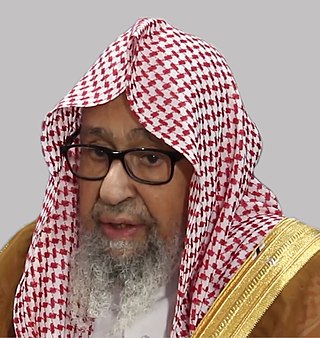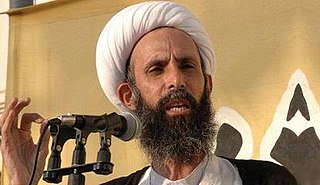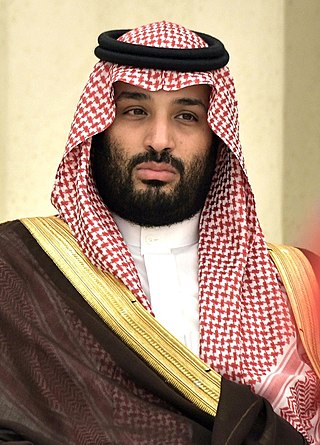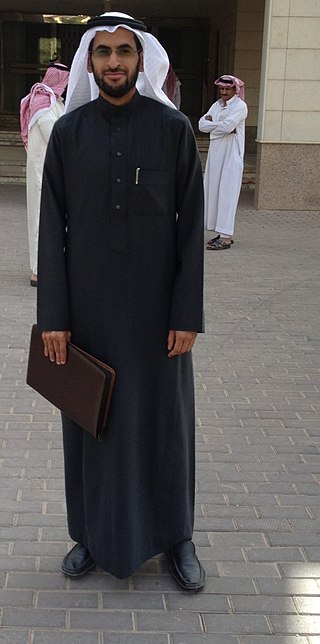Related Research Articles

The politics of Saudi Arabia takes place in the context of a unitary absolute monarchy, along traditional Islamist lines, where the King is both the head of state and government. Decisions are, to a large extent, made on the basis of consultation among the King, the Council of Ministers, Islamic scholars, tribal leaders and other traditional elites of the society. Saudi government is authoritarian, although some analysts have characterized the government of Mohammed bin Salman as totalitarian. The Crown Prince and Prime Minister of Saudi Arabia, Mohammed bin Salman, is the de facto ruler of Saudi Arabia. Under his rule, he has centralized policymaking, purged competing political elites, and dismantled pre-existing power-sharing dynamics.

The Kingdom of Saudi Arabia is an Islamic absolute monarchy in which Sunni Islam is the official state religion based on firm Sharia law. Non-Muslims must practice their religion in private and are vulnerable to discrimination and arrest. While no law requires all citizens to be Muslim, non-Muslim foreigners attempting to acquire Saudi Arabian nationality must convert to Islam. Children born to Muslim fathers are by law deemed Muslim.

The House of Al Saud is the ruling royal family of Saudi Arabia. It is composed of the descendants of Muhammad bin Saud, founder of the Emirate of Diriyah, known as the First Saudi State (1727–1818), and his brothers, though the ruling faction of the family is primarily led by the descendants of Abdulaziz bin Abdul Rahman, the modern founder of Saudi Arabia. It forms a subtribe of the larger prominent ancient Banu Hanifa tribe of Arabia, from which well known 7th century Arabian theologist Maslama ibn Ḥabīb originates. The most influential position of the royal family is the King of Saudi Arabia, an absolute monarch. The family in total is estimated to comprise 15,000 members; however, the majority of power, influence and wealth is possessed by a group of about 2,000 of them. Some estimates of the royal family's wealth measure their net worth at $1.4 trillion. This figure includes the market capitalization of Saudi Aramco, the state oil and gas company, and its vast assets in fossil fuel reserves, making them the wealthiest family in the world and the wealthiest in recorded history.

Human rights in Saudi Arabia are a topic of concern and controversy. Known for its executions of political protesters and opponents, the government of the Kingdom of Saudi Arabia has been accused of and denounced by various international organizations and governments for violating human rights within the country. An absolute monarchy under the House of Saud, the government is consistently ranked among the "worst of the worst" in Freedom House's annual survey of political and civil rights and was in 2023 ranked as the world's most authoritarian regime.

Salman bin Abdulaziz Al Saud is King of Saudi Arabia, reigning since 2015, and was also Prime Minister of Saudi Arabia from 2015 to 2022. The 25th son of King Abdulaziz, the founder of Saudi Arabia, he assumed the throne on 23 January 2015. Prior to his accession, he was Crown Prince of Saudi Arabia from 18 June 2012 to 23 January 2015. Salman is the third oldest living head of state, the oldest living monarch, and Saudi Arabia's first head of state born after the unification of Saudi Arabia. He has a reported personal wealth of at least $18 billion, which makes him the third wealthiest royal in the world and one of the wealthiest individuals in the world.

Jamal Ahmad Khashoggi was a Saudi journalist, dissident, author, columnist for Middle East Eye and The Washington Post, and a general manager and editor-in-chief of Al-Arab News Channel who was assassinated at the Saudi consulate in Istanbul on 2 October 2018 by agents of the Saudi government at the behest of Crown Prince Mohammed bin Salman.

Salman bin Fahd bin Abdullah al-Ouda or Salman al-Ouda, Salman al-Oadah, Salman al-Audah, or Salman al-Awdah - kunya: Abu Mu'ad - is a Saudi Muslim scholar. Al-Ouda is a member of the International Union for Muslim Scholars and on its board of trustees. He is a director of the Arabic edition of the website Islam Today and appears on a number of TV shows and authors newspaper articles.

Ed Husain is a British author and a professor in the Walsh School of Foreign Service in Georgetown University. As a political advisor he has worked with leaders and governments across the world. He is also a senior fellow and director of the Atlantic Council’s N7 Initiative which is focused on peace in the Middle East and broadening and strengthening relationships between Israel and its Arab and Muslim neighbours. He has held senior fellowships at think tanks in London and New York, including at the Council on Foreign Relations (CFR) at the height of the Arab uprisings (2010–2015). While at CFR, his policy innovation memo led to the US-led creation of a Geneva-based global fund to help counter terrorism. He is also a member of the editorial board of the Studies in Conflict & Terrorism, a monthly peer-reviewed academic journal covering research on terrorism and insurgency.

Women's rights in Saudi Arabia is a topic of international concern and controversy. Women in Saudi Arabia experience widespread discrimination in Saudi politics, economy and society.

Saleh Al-Fawzan is an Islamic scholar and has been a member of several high religious bodies in Saudi Arabia. He is considered to be the most senior scholar of Islam in Saudi Arabia.

Abdullah bin Abdulaziz Al Saud was King and Prime Minister of Saudi Arabia from 1 August 2005 until his death in 2015. Prior to his ascension, he was Crown Prince of Saudi Arabia since 13 June 1982. He was the tenth son of King Abdulaziz, the founder of Saudi Arabia.

The protests in Saudi Arabia were part of the Arab Spring that started with the 2011 Tunisian revolution. Protests started with a self-immolation in Samtah and Jeddah street protests in late January 2011. Protests against anti-Shia discrimination followed in February and early March in Qatif, Hofuf, al-Awamiyah, and Riyadh. A Facebook organiser of a planned 11 March "Day of Rage", Faisal Ahmed Abdul-Ahad, was allegedly killed by Saudi security forces on 2 March, with several hundred people protesting in Qatif, Hofuf and al-Amawiyah on the day itself. Khaled al-Johani demonstrated alone in Riyadh, was interviewed by BBC Arabic Television, was detained in ʽUlaysha Prison, and became known online as "the only brave man in Saudi Arabia". Many protests over human rights took place in April 2011 in front of government ministry buildings in Riyadh, Ta'if and Tabuk and in January 2012 in Riyadh. In 2011, Nimr al-Nimr encouraged his supporters in nonviolent resistance.
Hatoon Ajwad al-Fassi is a Saudi Arabian historian, author and women's rights activist. She is an associate professor of women's history at King Saud University in Saudi Arabia, where she has been employed since 1989 and at the International Affairs Department at Qatar University. At the university, al-Fassi carries out historical research. Al-Fassi claims from her research into the pre-Islamic Arabian kingdom of Nabataea that women in the kingdom had more independence than women in modern Saudi Arabia. Al-Fassi was active in women's right to vote campaigns for the 2005 and 2011 municipal elections and was active in a similar campaign for the 2015 municipal elections. She was arrested in late June 2018 as part of a crackdown on women's activists and was released in early May 2019.

Ayatollah Sheikh Nimr Baqir al-Nimr, commonly referred to as Sheikh Nimr, was a Shia sheikh from Al-Awamiyah in Saudi Arabia's Eastern Province whose arrest and execution was widely condemned, including by governments and human rights organizations.
Dissidents have been detained as political prisoners in Saudi Arabia during the 1990s, 2000s, 2010s, 2020s and earlier. Protests and sit-ins calling for political prisoners to be released took place during the 2011–2012 Saudi Arabian protests in many cities throughout Saudi Arabia, with security forces firing live bullets in the air on 19 August 2012 at a protest at al-Ha'ir Prison. As of 2012, recent estimates of the number of political prisoners in Mabahith prisons range from a denial of any political prisoners at all by the Ministry of Interior, to 30,000 by the UK-based Islamic Human Rights Commission and the BBC.

Mohammed bin Salman Al Saud, popularly known by his initials as MBS or MbS, is the heir apparent to the Saudi Arabian throne. He is currently Crown Prince and Prime Minister of Saudi Arabia. He is the seventh son of King Salman of Saudi Arabia and grandson of the nation's founder, King Abdulaziz.
The modern history of Saudi Arabia begins with the declaration of the unification of Saudi Arabia in a single kingdom in 1932. This period of time in Saudi Arabia's history includes the discovery of oil in Saudi Arabia and many events. It goes on to encompass Saudi Arabia's brief involvement in World War II in 1945. Afterwards, it includes Saudi Arabia's involvement in the Western Bloc and the Cold War. It also includes Saudi Arabia's proxy conflict with Iran, the Arab Spring, and the ongoing Arab Winter.

The 500 Most Influential Muslims is an annual publication first published in 2009, which ranks the most influential Muslims in the world.

Abdulaziz bin Mohammed al-Hussan is a Saudi Arabian lawyer and reformist born on March 10, 1981, in Riyadh, the kingdom of Saudi Arabia.

The 2017–19 Saudi Arabian purge was the mass arrest of a number of prominent Saudi Arabian princes, government ministers, and business people in Saudi Arabia on 4 November 2017. It took place weeks after the creation of an anti-corruption committee led by Crown Prince Mohammed bin Salman.
References
- 1 2 "Abdullah Alaoudh". The Guardian. Retrieved 21 July 2023.
- ↑ Alaoudh, Abdullah. "Opinion | Biden must not betray defenders of democracy in Saudi Arabia". The Washington Post. Retrieved 21 July 2023.
- ↑ Freedom Forward (22 September 2022). "Abdullah Alaoudh joins Freedom Forward's Advisory Board". Freedom Forward. Retrieved 21 July 2023.
- 1 2 "Abdullah Alaoudh - ACMCU". Acmcu.georgetown.edu. Retrieved 21 July 2023.
- ↑ "BBC News - HARDtalk, Abdullah Alaoudh - Senior Fellow, Georgetown University". Bbc.co.uk. Retrieved 21 July 2023.
- ↑ Alaoudh, Abdullah (30 December 2020). "Opinion | Saudi Arabia Is Slowly Killing My Father - The New York Times". The New York Times . Retrieved 21 July 2023.
- ↑ "Saudi execution of scholar Salman al-Odah would be 'state-sanctioned murder', son says". Middle East Eye. 14 August 2019. Retrieved 21 July 2023.